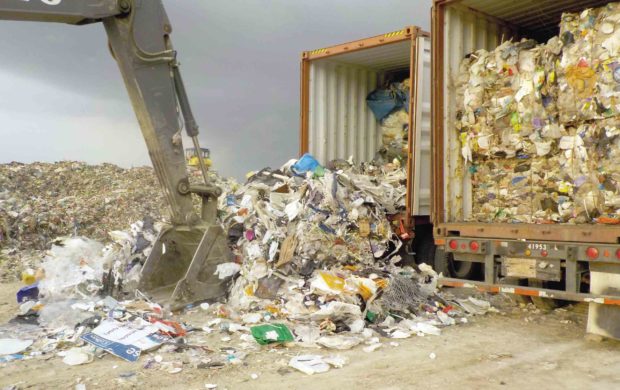Environmental groups press return of waste to Canada

TUG OF TRASH Canada has not taken back its containers full of household trash that were misdeclared and smuggled into the country in 2013. —Photo from Metro Clark Waste Management Corp.
CITY OF SAN FERNANDO, Philippines — The EcoWaste Coalition and four other environmental groups have renewed their call for Canada to take back waste sent to the Philippines six years ago, following a legal opinion that the north American country has violated the Basel Convention.
Falsely declared
The Pacific Center for Environmental Law and Litigation (PCELL) said Ontario-based Chronic Inc. shipped 35 40-foot containers of misdeclared trash to the country in 2013, which amounted to “illegal traffic” under Article 9 of the Basel Convention. This treaty regulates the movement of all forms of rubbish, particularly toxic waste.
PCELL said: “The wastes were falsely declared to contain homogeneous plastic scrap material when in fact these shipments contained mixed waste, including household garbage, and since the wastes were deemed to be hazardous under Philippine law.”
In their April 15 letter, Aileen Lucero of EcoWaste, Kathleen Ruff of RightOnCanada, Theresa McClenaghan of the Canadian Environmental Law Association, Dr. Tadesse Amera of IPEN (International Persistent Organic Pollutants Elimination Network) and Jim Puckett of the Basel Action Network asked Canadian Prime Minister Justin Trudeau to act immediately on PCELL’s statement.
Article continues after this advertisementThe groups said Trudeau must “provide a clear and definite date by which it will repatriate its garbage so that this protracted ordeal can finally be promptly ended.”
Article continues after this advertisement“Canada should meet the standard set by the Republic of Korea which has acted to promptly arrange the return of its wastes illegally dumped in the Philippines, citing convention obligations,” they said.
Three batches
EcoWaste said the trash arrived in three batches at the Manila International Container Port (MICP) between June 23 and Aug. 4 in 2013 for consignee Chronic Plastics in Valenzuela City. At least 15 more containers arrived in MICP from Aug. 10 to 21.
Customs impounded all 50 containers, transferring 23 to the Port of Subic in August 2014 to decongest MICP. Customs disposed of 1,375 tons of wastes from 26 containers in a landfill operated by the Metro Clark Waste Management Corp. in Capas, Tarlac, which drew local protests.
From December 2013 to January 2014, Chronic Inc. sent a second batch of 48 containers and a third batch of five containers, all consigned to Live Green Enterprises. These containers were unclaimed.
All in all, 103 containers of wastes were illegally brought to the Philippines, Lucero said. Minus the 26 containers emptied in Tarlac, 77 containers might be leaching and rotting in MICP and Port of Subic, she said.
In June 2016, Judge Tita Bughao Alisuag of the Regional Trial Court in Manila ordered the 50 containers to be sent back to Canada, stating that “our country should not be made a trash bin by another country.”
“This should not be made a precedent for other countries to follow,” she ruled.
At the 31st summit of the Association of Southeast Asian Nations in November 2017, Trudeau said it was “now theoretically possible to get [the trash] back.”